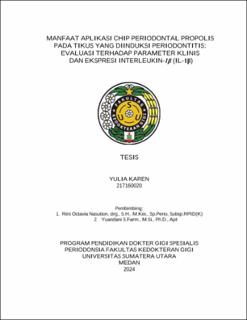Manfaat Aplikasi Chip Periodontal Propolis pada Tikus yang Diinduksi Periodontitis: Evaluasi terhadap Parameter Klinis dan Ekspresi Interleukin-1β (IL-1β)
Benefits of Propolis Periodontal Chip Application in Periodontitis-Induced Rats: Evaluation of Clinical Parameters and Interleukin-1B(IL-1B) Expression

Date
2024Author
Karen, Yulia
Advisor(s)
Nasution, Rini Octavia
Yuandani
Metadata
Show full item recordAbstract
Background: Periodontitis is an infection of the tissues that support the teeth. This infection can cause serious damage to the gums, bone, cementum, and periodontal ligaments that hold the teeth in place. Scaling and root planing (SRP) is the standard non-surgical treatment for periodontal disease. This treatment involves removing plaque and calculus from the surfaces of the teeth and roots. Scaling and root planing is effective in eliminating harmful bacteria that cause infection, but it has limitations in reaching deep periodontal pockets and furcation areas. This may necessitate additional antimicrobial therapy to help control the infection. Propolis is a resinous substance produced by bees that has antibacterial and anti-inflammatory properties that have been shown to be beneficial in the treatment of various health conditions. Previous research has shown that propolis can help reduce inflammation and promote wound healing in gums affected by periodontal disease. Objectives: To analyze the effectiveness of the application of periodontal propolis chip as adjuvant therapy in male wistar rats on clinical parameters and Interleukin 1-β (IL-1β). Methods: An experimental laboratory study with a posttest control group design was conducted on 45 male wistar rats induced with periodontitis using Porphyromonas gingivalis and ligated with silk. The rats were then divided into five treatment groups:placebo group (application of placebo periodontal propolis chip), positive control group (application of 2.5 mg chlorhexidine chip), treatment group 1 (application of 2.5% periodontal propolis chip), treatment group 2 (application of 5% periodontal propolis chip), and treatment group 3 (application of 10% periodontal propolis chip). Clinical parameter assessments (Gingival Index (GI), Bleeding on Probing (BoP), Pocket Depth (PD), Clinical Attachment Loss (CAL)) and IL-1β expression were performed on days 0, 3, and 7 after treatment in the rats. Results: The results of this study showed significant improvements and decreases in the clinical parameters GI, BoP, PD, and CAL. Examination of IL-1β expression also showed a significant statistical decrease (p<0.05). Conclusion: The application of periodontal propolis chip can significantly improve GI, BoP, PD, and CAL and reduce IL-1β expression.
Collections
- Master Theses [52]
